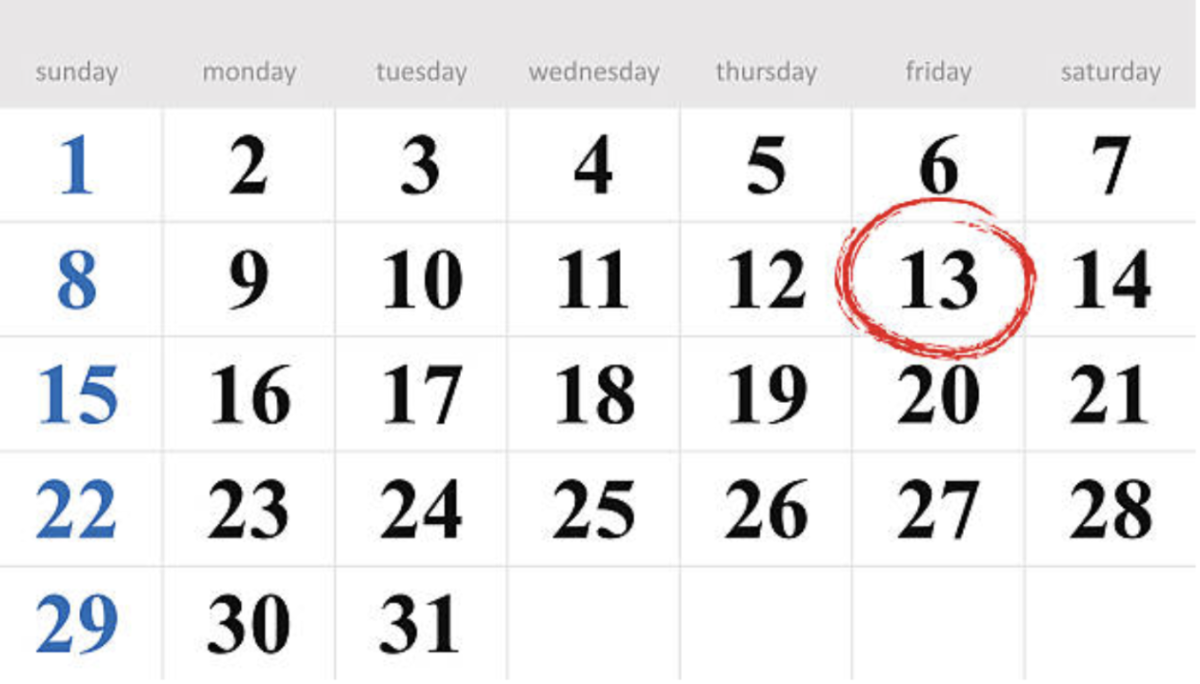Walking under ladders. Black cats. A shattered mirror.
We have come to accept these social superstitions of unluckiness in modern-day culture, at least to an extent. But there is one that is consistently viewed as a general omen for bad luck and arguably, provokes the most uneasiness within us: Friday the 13th. But why? Why as a Western society have we evolved to associate an evil tendency with these two simple digits and their place on the calendar? We can start by examining the historical theories of where the bad energy of 13 originates from.

The most prominent example is The Last Supper, where Jesus and his 12 apostles savored his last meal. Judas, the last to arrive at the dinner (and subsequently the 13th member), would soon be revealed as Jesus’ betrayer which leads to his crucifixion. The weekday of Friday comes into play as Jesus was crucified on the day following his last supper, a Friday.
There is a similar story involving 13 guests at a dinner party found in Norse mythology. Loki, the god of mischief, infamously crashes a feast with 12 gods and tricks the god Hodr into shooting Balder (the god of joy and gladness) with a poisoned arrow. While 13 has clearly proved to have some damaging effects on the attendees of these dinner parties, where else can it be found in history? Let’s go back to the 14th century, where citizens of France witnessed the end of the Knights Templar, the Christian group dedicated to the protection of pilgrims and crusader states.
On none other than Oct. 13, 1307, King Phillip IV ordered mass arrests against members of the organization, resulting in extreme torture or execution. These examples make it evident how the number 13 can carry some notorious connotations in the Christian religion, and therefore, the basis of a lot of Western culture, whether we are aware of it or not.
While this may explain some of the history of the number, how can it be analyzed today, within our modern day culture? To some of you, 13 may hold significance as the favorite number and philosophical guide of the overwhelmingly popular Taylor Swift. Seeing as the popstar was born on Dec. 13, 1989, her use and adoration of the number have bled into her identity as well as the style of her fans; Swift has admitted to painting her lucky number on her hand before every show, a tradition her fans now follow as well.
Or maybe 13 brings to mind the iconic jersey number of former Yankees player and ex-husband of Jennifer Lopez, Alex Rodriguez. Rodriguez chose his jersey number in honor of retired Miami Dolphins quarterback, Dan Marino, as an homage to his home city. This idea of connecting an identity to something as simple as a number is something we can all find examples of in our daily lives.
Whether it was choosing a number for your Little League team or selecting which digits will bring you the most luck on a lottery ticket, numbers and their personal relations to us are found everywhere. When trying to find how the malicious calendar date has woven its way into our culture, we can start by examining the beloved horror movie series, “Friday the 13th.” This bloody, murderous summer camp classic series enthralled audiences and quickly became a cult classic after the first film’s release in 1980.
The immensely popular series spanned almost 30 years and spun off into comic books, video games and a TV series, all with corresponding merchandise. The success of the series ultimately redefined what a horror-slasher can look like. Is this where our fear of Friday the 13th comes from? This mystery only grows increasingly complex when examining how other cultures perceive the 13th day of the month.
In one of my Spanish classes, my professor asked if any of us had plans for Friday the 13th, and when no one expressed worry, she was unphased as she said it is Tuesday, or Martes, the 13th, that we should look out for. This could result from Tuesday’s connection to the Roman god of war, Mars. Or maybe it’s because the decline of Constantinople fell on Tuesday, April 13.
Suffice to say, no matter what day of the week, the 13th will always contain historical and cultural significance. In Hispanic cultures, it is Tuesday that holds the unlucky touch rather than Friday, only complicating our search for answers in this cultural phenomenon. This infamous date is especially prominent in this year’s calendar, seeing as it not only appears in September, but December as well.
Although most of my friends don’t believe they will face bad luck this Friday the 13th, they acknowledge the coincidence of 2024’s double unlucky Fridays and find entertainment in marking the calendar dates. How much power do you believe Friday the 13th has over your day? A spiderweb of ancient history, popular culture and maybe a little Swift, Friday the 13th will always hold cultural value, whether or not the unluckiness comes with it. Although I myself stand divided on the supernatural powers of this infamous date I do have one piece of advice for you: this coming Friday the 13th, just maybe don’t host a dinner party with 12 of your friends.
.




















